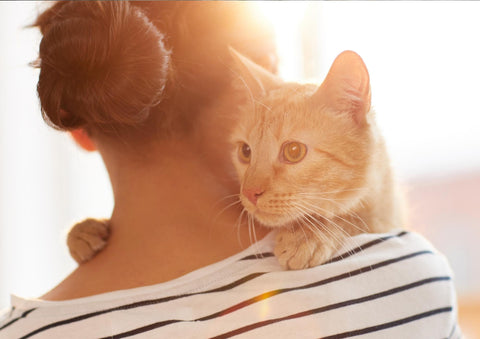Get 10% OFF When YOU Purchase Any 3 T-Shirts or 3 Shirts
Get 10% OFF When YOU Purchase Any 3 T-Shirts or 3 Shirts

Why does my cat meow so much?
%月 %日, %年 3 读

Why does my cat meow so much? What can I do to make it stop? We'll answer those questions and more in this article to help you learn how to understand your cat's language. Meow!
Meows are a cat's primary mode of communication, aside from body language. A meow can come in many forms and for several reasons. But what happens when your cat is meowing at you constantly? Is it really something to be concerned about? Read on, and let’s find out what our cats might be telling us with these meows.
Here are some of the most common reasons cats meow constantly, as well as tips on how to get a cat to stop meowing so much.
I’m lonely and I want your attention.

Cause: If your cat spends long periods of time alone at home, she may be lonely and simply want your attention. A bored or lonely cat will meow because they want you to play with them, pet them or just talk to them.
Solution: Spending more time with your cat is an easy way to reduce that attention-seeking meows! Consider leaving some toys out for her to play with while you're gone. You can purchase a cat tree as well as interactive toys. You can also put a bird feeder outside her favorite window to attract birds and keep her entertained for hours.
I’m not feeling well.

Cause: If your cat starts meowing more than usual, this could indicate a medical issue or stress. A variety of medical conditions can cause pain, as well as extreme hunger, thirst, restlessness, and anxiety. “Meowing” could be your cat’s way of telling you that it needs your help.
Solution: Talk to your veterinarian and discuss what might be going on with your cat. They’re experts at providing cat care advice and solutions to your cat's health issues.
I want food.

Cause: The “I’m hungry” meow is likely one all cat parents know well. Cats can be quite vocal about their hunger. If your cat's food bowl is empty, surely he will let you know by meowing loudly.
Solution: To train your cat not to do this, don't feed her when she meows. Instead, wait until she's quiet before setting down her bowl. Don't give her treats when she cries. She'll eventually realize that being quiet means it's time for food. You can also experiment with an automatic feeder, which releases a portion of food at a set time every day.
I’m getting old.

Cause: Cats' vision and hearing typically get worse over time, and meowing can be caused by confusion or disorientation.
Solution: Give your senior cat plenty of loving attention to soothe and reassure them. A simple night light can help an elderly cat with visual deficits or impaired cognitive function feel more secure, which may tone down nighttime meowing. Calming beds can also help to give them a cozy and relaxed sleep. Veterinarians can also prescribe medications to alleviate these symptoms.
I’m in the mood (for love).

Cause: Like every other species, cats want to breed. If your cat isn't spayed or neutered, you'll notice a lot more noise. Especially female cats might yowl incessantly when in heat.
Solution: Spaying or neutering them will put an end to this behavior. Consult your veterinarian about neutering or spaying your cat.
I’m just a Chatty Catty.

Cause: Some breeds, such as the Siamese, Oriental, Singapura, Siberian, and Tonkinese, are just chatty catty breeds.
Solution: This trait just comes naturally to these breeds, so there isn't much you can do to change it.
Always remember that the meow of your cat is an expression of concern, love, and communication. Your best friend might be trying to tell you something important with these constant meowing.

If we take the time to understand their various meows and give them all the attention, needs, and love they deserve, surely they will live the happiest and healthiest lives possible!
Visit our Blogs Section for more interesting and fun facts about our beloved cats here!
留个言
张贴前管理员会先审核您的留言
Subscribe
Sign up to get the latest on sales, new releases and more …
